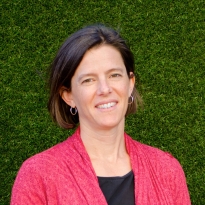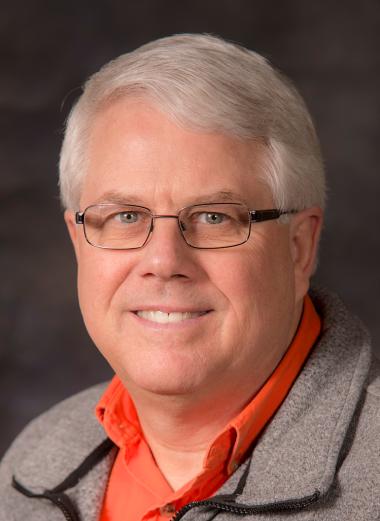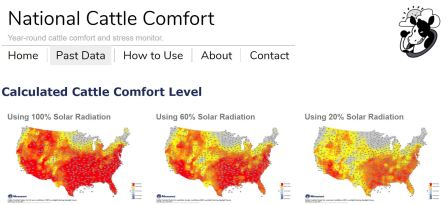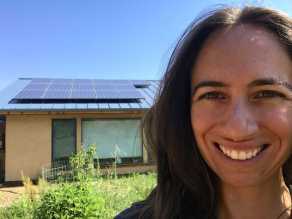
CONSERVE, A Transdisciplinary Research, Extension and Education Program at the Nexus of Sustainable Water Reuse, Food and Health
Presented by Amy Sapkota, PhD.
View Webinar Info Now (No Registration Required)
Our changing climate, escalating water demands from nonagricultural sectors, and depletion of groundwater sources by agricultural use are immediate challenges that call for the urgent need to explore and adopt safe, alternative irrigation strategies to sustain food production across the U.S. As a result, water reuse and the exploration of nontraditional irrigation sources have become national priorities with regard to agricultural water security and the sustainable production of our food supply. At the same time, the recent Food Safety Modernization Act is shifting the focus of food safety from responding to contamination to preventing it. This emphasis towards the prevention of foodborne illnesses places great responsibility on agricultural producers, who must meet stricter guidelines with regard to the quality of irrigation water used on food crops. Hence, at this critical juncture in food production, sustainable on-farm solutions are needed to enable agricultural producers to conserve groundwater and adopt safe, alternative approaches to irrigation.
To address this need, CONSERVE: A Center of Excellence at the Nexus of Sustainable Water Reuse, Food, and Health was established at the University of Maryland, School of Public Health through funding from the United States Department of Agriculture (USDA) National Institute for Food and Agriculture (NIFA). CONSERVE employs a systems approach to 1) evaluate the availability (quantity and quality) of nontraditional irrigation water sources (e.g. recycled water, brackish water, return flows) that could be used to help agricultural producers conserve groundwater; 2) identify the socio-behavioral, economic and regulatory factors that impact the use of these sources; and 3) develop, implement, and evaluate on-farm water treatment technologies for the safe and successful use of nontraditional irrigation water. We then share this new knowledge with agricultural and non-agricultural communities, and employ experiential education to teach, train, and inspire future leaders. This webinar will provide an overview of CONSERVE, as well as examples of our year 1 achievements. By the end of the webinar, participants will gain insights into the complex global picture of the potential for recycled water to become a more commonly accepted and used source for irrigation of food crops. As we move into a time of increasing water scarcity, a shift in water use strategies will be essential to sustain food production in arable land across the world.

Dr. Amy R. Sapkota is currently an Associate Professor in the Maryland Institute for Applied Environmental Health at the University of Maryland, School of Public Health. Dr. Sapkota received a PhD in Environmental Health Sciences from the Johns Hopkins Bloomberg School of Public Health, and an MPH in Environmental Health Sciences from the Yale School of Public Health. She completed a post-doctoral fellowship with the Environmental Microbial Genomics Group within Le Centre National de la Recherche Scientifique in Lyon, France. Dr. Sapkota’s research interests lie in the areas of environmental microbiology, environmental microbial genomics, exposure assessment and environmental epidemiology. Her projects focus on evaluating the complex relationships between environmental exposures and adverse health outcomes. Currently, Dr. Sapkota is the Director of “CONSERVE: A Center of Excellence at the Nexus of Sustainable Water Reuse, Food and Health” which was established in 2016 through funding from the U.S. Department of Agriculture, National Institute for Food and Agriculture. The mission of CONSERVE is to facilitate the adoption of transformative on-farm solutions that enable the safe use of nontraditional irrigation water on food crops, effectively reducing the nation’s agricultural water challenges that are exacerbated by climate change. In addition to CONSERVE, Dr. Sapkota is a Co-Principal Investigator within the University of Maryland/Battelle, Tobacco Center of Regulatory Science and leads a study that is exploring tobacco microbial constituents and the oral microbiome of tobacco users. To begin to expand this work to international settings, Dr. Sapkota recently completed a Fulbright Senior Scholarship in collaboration with the B.P. Koirala Memorial Cancer Hospital located in Chitwan, Nepal, where the team explored the relationships between the oral microbiome, tobacco use and lung cancer risk.













 Meagan Schipanski, co-director of the USDA-NIFA funded Ogallala Water Coordinated Agriculture Project (OWCAP) is an Assistant Professor at CSU. Her research focuses on understanding plant-soil interactions that mediate nutrient cycling using concepts from ecology and biogeochemistry. Her group investigates organic matter, nutrient, and water dynamics within cropping systems from rhizosphere to global scales using on-farm, experiment station, greenhouse, and modeling experiments.
Meagan Schipanski, co-director of the USDA-NIFA funded Ogallala Water Coordinated Agriculture Project (OWCAP) is an Assistant Professor at CSU. Her research focuses on understanding plant-soil interactions that mediate nutrient cycling using concepts from ecology and biogeochemistry. Her group investigates organic matter, nutrient, and water dynamics within cropping systems from rhizosphere to global scales using on-farm, experiment station, greenhouse, and modeling experiments. Join us to learn how to use the
Join us to learn how to use the  Albert Sutherland coordinated development of the National and Oklahoma Cattle Comfort Advisors. He leads agricultural and horticultural product development and extension outreach for the Oklahoma Mesonet. He has a Bachelor’s degree in horticulture from Oregon State University, a Masters in horticulture from Ohio State University, and has worked for Oklahoma State University since 1989.
Albert Sutherland coordinated development of the National and Oklahoma Cattle Comfort Advisors. He leads agricultural and horticultural product development and extension outreach for the Oklahoma Mesonet. He has a Bachelor’s degree in horticulture from Oregon State University, a Masters in horticulture from Ohio State University, and has worked for Oklahoma State University since 1989.  The USDA Forest Service Reforestation, Nurseries, and Genetic Resources team has been assigned the task of determining how best to develop seed zones for Region 9, the Northeastern Area, and the Southern Region. These seed zones are being developed to help the National Forest System address sustainable forest management and ecosystem restoration challenges related to climate change in a uniform manner across regional and political boundaries. These seed zones should be developed in a manner encourages their adoption by state partners, the Department of Agriculture (USDA), Department of Interior (DOI), state forestry agencies, NGOs, seed producers, land managers, and other interested groups or individuals.
The USDA Forest Service Reforestation, Nurseries, and Genetic Resources team has been assigned the task of determining how best to develop seed zones for Region 9, the Northeastern Area, and the Southern Region. These seed zones are being developed to help the National Forest System address sustainable forest management and ecosystem restoration challenges related to climate change in a uniform manner across regional and political boundaries. These seed zones should be developed in a manner encourages their adoption by state partners, the Department of Agriculture (USDA), Department of Interior (DOI), state forestry agencies, NGOs, seed producers, land managers, and other interested groups or individuals.

 Dr. Roslynn Brain McCann is a Sustainable Communities Extension Specialist in the Department of Environment and Society, College of Natural Resources at Utah State University. She uses conservation theory, communication techniques, and social marketing tools to foster environmental behaviors in the areas of land (conservation, reducing, reusing and recycling), air (quality and climate change), food (consuming locally with a focus on CSA’s and farmer’s markets), water (quality, quantity, water resilient landscaping), and energy (efficiency and renewable energy). Roslynn also teaches communicating sustainability, chairs the National Network for Sustainable Living Education, helps facilitate the National Extension Sustainability Summit, runs a national database of sustainability-focused Extension programs, and is the coordinator for Utah Farm-Chef-Fork, the USU Permaculture Initiative, and Sustainable You! kids’ camps.
Dr. Roslynn Brain McCann is a Sustainable Communities Extension Specialist in the Department of Environment and Society, College of Natural Resources at Utah State University. She uses conservation theory, communication techniques, and social marketing tools to foster environmental behaviors in the areas of land (conservation, reducing, reusing and recycling), air (quality and climate change), food (consuming locally with a focus on CSA’s and farmer’s markets), water (quality, quantity, water resilient landscaping), and energy (efficiency and renewable energy). Roslynn also teaches communicating sustainability, chairs the National Network for Sustainable Living Education, helps facilitate the National Extension Sustainability Summit, runs a national database of sustainability-focused Extension programs, and is the coordinator for Utah Farm-Chef-Fork, the USU Permaculture Initiative, and Sustainable You! kids’ camps.